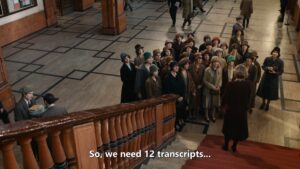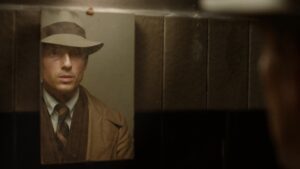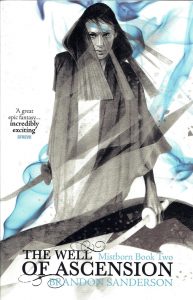Finished listening to Babylon Berlin, and despite not expecting much from the book initially, I must say it ended up being somewhat of a disappointment. Too much in the story is just left to chance: someone shot, missed, but hit something else – Deus ex Machina at its finest. Or worst.
Maybe I’d give TV series a try, but certainly not the next book in the series.
Category: *.DOC
О книгах
Babylon Berlin
The book certainly has some interesting ideas. Rath ends up accidentally shooting a man who’s been following him. Then he’s put on the case of investigating that same murder. Moreover, he discovers that his buddy has killed another cop who was secretly working for the Political Police, and now that buddy tries to frame Rath. It’s not brilliant by any means, but it’s better than standard “noir” “an alcoholic cop shaking a mob boss” theme.
Dragon Reborn, Robert Jordan
I finished this book probably a month ago, but forgot to take notes about it.
It’s a strange book, with some interesting ideas: mainly that the minions of the local version of Sauron have plans of their own. And the “epic” scope: Children of the Light, for all their importance, show up in just two chapters, and Seanchan are forgotten completely.
Strange, because the trope “Egwene, Nynaeve and Elayne get captured” is repeated twice within the same book. This is after “Egwene gets enslaved” was one of the main themes of the previous book as well.
And the trope “Rand thinks he finally killed the Dark One” is repeated for the third time over three books. It’s like Rand never learns.
We’re constantly told how powerful Forsaken are. But then Moiraine just burns one down in an instant with Balefire.
Other than that, it’s very fatalistic. As, all characters are pulled together to the same places over and over again by fate. Even feelings Egwene, Min and Elayne have for Rand are mostly described as a pull of fate. If I’m not mistaken, by the third book Elayne met the guy once, and Min twice, but they all talk about how much they love him.
It’s interesting to unpack how TV series are different from the book.
Charlotte in the book is referred to as “Charlie”, while in the TV series she’s called “Lotte”. In the book, she’s quite successful, and doing a work of an investigator, despite being a stenographer. In the series, she’s struggling to pay her rent with an one-off job at the police station.

Rath is immediately introduced as a “shaker”, having to rely on laundaum to stay in the police. In the book, he’s an occasional drinker, but not much else.
There’s a comic episode in the series which wasn’t present in the books: Rath and Lotte get the photos of their investigations mixed together. Rath works in Vice, and Lotte works in Homicide, so they have to sort together through pornography and murdered victims photos.
Started listening to the 3rd book of the Wheel of Time. It feels like Jordan was paid for every word.
Here’s a typical “dialog”:
— Can they?
— This is something known only to a few, child, even in the Tower. You should not learn it now, if ever, but I will tell you. There is—a weakness in being able to channel. That we learn to open ourselves to the True Source means that we can be—opened to other things. Calm yourself, child. It is not so easily done.
It is a thing not done, so far as I know—Light send it has not been done!—since the Trolloc Wars. It took thirteen Dreadlords—Darkfriends who could channel—weaving the flows through thirteen Myrddraal. You see? Not easily done. There are no Dreadlords today. This is a secret of the Tower, child. If others knew, we could never convince them they were safe. Only one who can channel can be turned in this way. The weakness of our strength. Everyone else is as safe as a fortress; only their own deeds and
will can turn them to the Shadow.
One character, usually a younger one, asks a simple question, then another character spills that bullshit load of lore on them without blinking. That is not how people talk.
I am Pilgrim, Terry Hayes
Completed “I am Pilgrim”. Officially the worst book I’ve read in years.
The only positive thing about this book is that the author shoots in all directions, so to say.
He criticizes EU immigration policies, and failures to expel illegal migrants even with radical Islamist background.
Funny how the book constantly betrays the idea of “show don’t tell”. The reader is constantly told how good of an agent and investigator Scott is. But he’s nothing but. He’s impatient, anxious, arrogant, can’t control his temper, falls for the simplest of tricks and speaks to himself in front of others betraying literal secrets. Almost a parody.
The fact that a book is promoted doesn’t mean it’s any good. This one isn’t.
The hero is a Mary Sue. The youngest in the Service, bla-bla. Shoots his boss because he’s working for the Russians. Gets his job. Yeah, right. Also, he’s the adopted son of a millionaire, so it’s not an issue for him to retire at 30 and do whatever he likes. Like writing the best book about criminal investigation ever. Because why not.
Storytelling is amateurish. The author wanted to tell the story from the first person, but then decided he needed to tell another story from 10 years ago, which is supposed to be based on accounts of interrogations, but contains details nobody would mention, like what was going on in the head of a terrorist, or his soon-to-be dead victims. Amateurish.
Project Hail Mary, Andy Weir
Finished listening to Project Hail Mary. I hope I’ll never hear the words “petrovascope” and “astrophage” again.
Jokes aside, though, it’s a solid piece of science fiction, with some emphasis on science.
“Young Germans don’t blame their parents for starting the war. They blame them for losing it.”
Out of all John le Carre novels I’ve listened to until now, this is probably the best novel in terms of narrative yet. And it’s not really a spy novel, again! It’s a classical noir novel, with a “detective” in a trench coat, corrupt cops, unfaithful wives, and… Nazis.
The best part of the book, that made me laugh out loud, was the dinner that the head of Chancery, Bradfield, hosts. How the German and Dutch swear their “allegiance” to Britain, “my son studies there, my daughter studies there,” is so similar to how 50 years later, every Russian oligarch still sends their kids to study in Great Britain.
On a more serious and more nuanced tone, the book discusses what is the age of the Nazis’ crimes. Should they be forgiven in ’45? ’55? ’65? Never? Why is one arbitrary date better than the other?
And of course, common to le Carre is the theme of abandonment by your country, in this case, of a hunter for Nazis and a Jew asked to “forgive and forget.”
Looking Glass War, John le Carre
This is almost a satire. Instead of the almost omnipotent Circus from the previous books, the story focuses on another bureau, which is a complete opposite. Where agents carry their real documents with them on a mission, tell state secrets to their families, forget important backstory facts and mostly worry if they’ll be reimbursed for the taxi they took to the office.
Also, this may be a critique to British methods do act as if it’s still WWII, including using outdated and complicated WWII communication devices, because “people are used to them”.
As usual with Le Carre, the preparation to the operation is eighty percent of the book, while the operation itself, if it can be called it, is maybe ten percent.
The book is even more vague what is fact and what is fiction than some other novels, which is interesting. It is never clearly explained who killed Taylor, was the film real or just a setup. And probably that was never the point. As there are also no significant outcomes either, despite the obvious setup by the Circus to the Department, the later seem to continue functioning.
Finished listening to “Player of Games”.
This is basically a spy novel wrapped in Banks’ sci-fi utopia. A professor in game theory is bored with everything, and recruited by an intelligence agency to participate in a complex game played in a distant empire.
The empire is a parody on modern Britain, with fashion that haven’t changed hundreds of years (ouch), and all government positions decided by a result of a particularly elaborate Game. Hence universities that teach The Game have huge influence on politics of the Empire (ouch, ouch).
For ’88, the book is quite progressive. Banks plays with the idea that in the utopian future, people would be able to change their sex back and forth, for example. He also dedicates a lot of attention to the fact that AIs in this society considered to have the same rights as humans.
Overall, I enjoyed it far more than “Consider Phlebas”, his first book. It describes the obsession of something like a chess player quite well.
Great Hunt, Robert Jordan
It is indeed “The Great Hunt,” as instead of just a single MacGuffin, Jordan introduces two. It is common in fantasy to chase some artifact that should help in fighting evil. But here we have The Horn and The Dagger.
It’s like Jordan was paid for every word. I don’t have another reason why Egwene refers to Rand as “that wool-brained idiot” every. Single. Time.
Then there’s “Ingtar and his 20 knights.” At the beginning of the book, they set off, and then they do. Absolutely. Nothing. Steading? They need to stay outside. Town? They need to tend the horses? City? There are not enough disguises for everyone, so they have to stay behind. I understand it didn’t make much sense to send a knight alone, but this is still ridiculous.
What’s more ridiculous is how every woman in this book looks amazing. Not just the usual suspects, Egwene and Nynaeve, but also Aviendha, Min… It made sense for Lanfear, the seductress whose name I forgot; that’s her role. But there are no unattractive young women in this world, it seems.
Speaking of the world, it is interesting how Jordan seems two-minded: on one hand, the world is fatalistic; no matter what you do, the Wheel will bring you where you need to be. There are The Chosen and NPC, and all that. But then there’s also a Multiverse and different worlds that characters have to visit, both Rand and Nynaeve.
Murder of Quality, John le Carre
“It was from us they learnt the secret of life: that we grow old without growing wise. They realized that nothing happened when we grew up: no blinding light on the road to Damascus, no sudden feeling of maturity.”
Second Le Carre book, after “Call for the Dead”. This one is a disappointment, because it’s not a spy novel at all. Just quite a regular mystery novel with Smiley as the protagonist. But other than a reference to a middle-class woman as “she was red brick” and a description of the local chief of police in his office as a “water rat on a raft, his hair all wet”, there isn’t much I could get out of it.
Well of Ascension, Brandon Sanderson
Finished listening to the second book of Mistborn.
Brandon Sanderson gets the framing right, but everything else wrong in this one. What was the point of building Straff’s poisoning/addiction, if he just ended up being sliced in half? And I do hope that Zane’s voices and him having one of the spikes are explained in the 3rd book…
It is a very interesting decision to introduce a villain that is able to change the writings, thus affecting the prophesies over time in an attempt for people to release him from his prison. And the same goes for introducing The Deepness, and external danger that prompts people to try and fulfil the prophesies. Almost like Russia threatening the world with hunger unless its demands are met.
But characters like Eland and Vin are just annoying. Their virgin love and perfectness 🤢
Vin is the strongest “magic” user, and Eland is the heir to the most powerful house, that oh just so ends up an emperor by the end of the 2nd book, poor boy. And he gets superpowers as well, in order not to feel bad about becoming an emperor.
The politics were good. That, and the framing story were the only parts I enjoyed, though. I’ll probably listen to the 3rd book at some point, but now I need some rest from Vin’s “oh, how I love Eland”, and “Eland is a good man”.
Well of Ascension, Brandon Sanderson
Zane was the only interesting character in the second book. I’ll be sorry if he doesn’t return.
All that “love” between Vin and Eland is cringey as hell. They are in relations for two years, constantly thinking how they “love” each other, but Eland hadn’t even seen Vin naked? And then they decide to marry. Yeah, makes sense. If you’re a Mormon, maybe.
Ok, after writing this I discovered that he is literally a Mormon. I rest my case now…
Well of Ascension, Brandon Sanderson
There are good parts to this book. Hunting for a doppelganger among King’s advisors. A city besieged by multiple armies, and not just one. Very reasonable politics: traders want titles, nobility wants to end the siege so everything will go “back to normal”, commoners are just terrified.
But then there’s this “girl can’t choose between two boys” part. I can’t count how many times Vin just labels Eland, her boyfriend, “a good man”. Then there’s torment of “he thinks I’m a monster now, he’ll leave me”.
Also I noticed that I became totally uninterested in fight scenes. Or maybe those aren’t very good.
Interesting that even the best modern authors, such as Joe Abercrombie and Sanderson himself couldn’t avoid adding some kind of “orcs” to their universe. In Mistborn they’re called koloss, but it doesn’t change the brutish nature. Another similarity: both in Abercrombie’s and Sanderson’s universes those were created as by a magician for their needs.
Call for the Dead, John Le Carre
Finished listening to Call for the Dead. This is the first Le Carre novel, and for a first one, it’s written pretty well. It was obviously influenced by Julius and Ethel Rosenberg couple.
Listening to it after “The Spy Who Came in from the Cold” is interesting, because you can see how Mundt was retrofitted to be a double agent later on. There’s very little wiggle room for that in the original novel.
Also interesting that Dieter, Smiley’s pupil that switched to work for East Germany after the war, is confirmed dead by the end of the novel. I’d thought author would leave it hanging.
Casino Royale, Ian Fleming
The interesting part about that book is, it’s very much down-to-earth. I’m not sure if it’s the later books that made James Bond “jump the shark”, or if those were the movies. This isn’t even so much as a spy thriller, and more of a noir, to be honest.
Funny, the book was written when Beria was still alive.
One bit that is hard to get used to is the outright misogyny of Bond. And those that know me also know that I don’t use that term lightly.
I’ll just put here the quotes:
“Women were for recreation. On a job, they got in the way and fogged things up with sex and hurt feelings and all the emotional baggage they carried around. One had to look out for them and take care of them.”
“These blithering women who thought they could do a man’s work. Why the hell couldn’t they stay at home and mind their pots and pans and stick to their frocks and gossip and leave men’s work to the men. And now for this to happen to him, just when the job had come off so beautifully. For Vesper to fall for an old trick like that and get herself snatched and probably held to ransom like some bloody heroine in a strip cartoon. The silly bitch.”
Such a hero:
“He gazed for a moment into the mirror and wondered about Vesper’s morals. He wanted her cold and arrogant body. He wanted to see tears and desire in her remote blue eyes and to take the ropes of her black hair in his hands and bend her long body back under his.”
Slaughterhouse Five, Kurt Vonnegut
Finished listening to Slaughterhouse Five. Kurt’s writing has all the appeal of an old man yelling at a cloud. It ends quite abruptly. Maybe author got tired of the constant repetition. I felt that he was trying to make a point about the stolen kettle, but forgot what it was.
Slaughterhouse Five, Kurt Vonnegut
This again has very little to do with science fiction. It’s a fictitious account of Battle of the Bulge aftermath and the Bombing of Dresden. Of course America is to blame for everything, and only if it would stop producing weapons all the wars in the world would go away.

